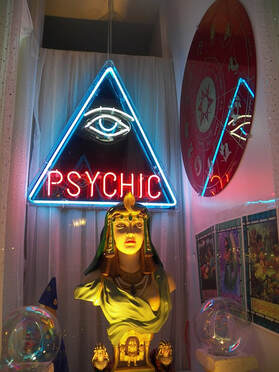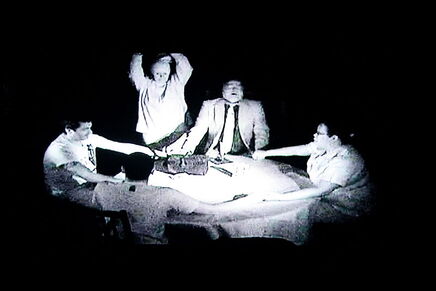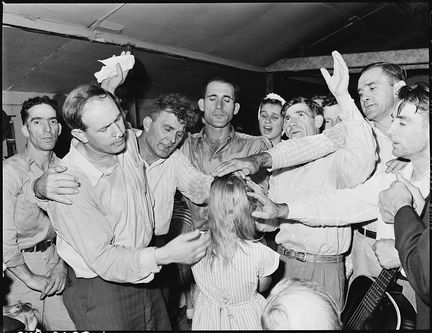|
10/24/2019 Can Believers and Skeptics Agree on Something When It Comes to the Supernatural?Read Now When it comes to the supernatural, believers and skeptics have a set of seemingly irreconcilable differences. Religious believers claim that faith healers can make miraculous healings happen. Believers in psychic phenomena claim that things like extrasensory perception (ESP) are real. Believers in spiritualism claim that the spirits of the dead can be contacted by individuals with special powers such as mediums. Skeptics however, point out that every time such occurrences have been investigated thoroughly, no evidence for their existence has been found. The disagreement between believers and skeptics has led to a lot of acrimony peppered with plenty of throwing up of hands, shaking of heads, and rolling of eyes. Can’t believers and skeptics agree on some things?  Seance Seance I think they can. For one thing, the vast majority of both believers and skeptics would agree that it is not ethical or moral for a fake faith healer, or psychic, or medium to deprive people of their hard-earned money through lies and trickery. There are many examples of such fakes. Many mediums in the United States in the 1920s were exploiting people’s pain over losing loved ones, tricking them into thinking they could communicate with their spirits. In the 1980s many psychics such as James Hydrick deceived people into believing they had supernatural powers. During this time period, the televangelist Peter Popoff was also active tricking people into believing he could cure them of their ailments through the power of God. In the 2000s psychics like Rosemary Altea fooled people into believing she could communicate with their dead relatives. In the 2010s, the psychic Maria Duval and her associates tricked as many as 1.4 million American, most of them elderly and sick, into sending money by mail in exchange for psychic help to heal their ailments or improve their economic situation. If a person is promised a service such as contacting their dearly departed, or the healing of a malady, finding love, improving their economic situation, or a peek into their future in exchange for their money, then said person is entitled to receive just what they were promised. This is a very basic and straightforward principle based on universal common sense notions of honesty. But this just leads us to the cause of the acrimony between believers and skeptics. By which procedure do we determine whether a faith healer, a psychic, or a medium is honest or fake in a manner that will be accepted by both sides? I don’t know a definite answer to this question, but I do have a suggestion regarding how stringent the procedure should be. Let me build my case for it. Let’s start with Penn and Teller. These guys are a fantastic duo of magicians. They have been in the business for decades. They have a huge knowledge regarding how magic is performed, and not only do they perform amazing tricks, but they also invent new ones. Penn and Teller have a show called “Fool Us” where they invite the best magicians in the world to try to fool them. In other words, to try to perform a magic trick for them that they can’t figure out how it’s done. Despite their experience and their knowledge, Penn and Teller have been fooled quite a number of times by other magicians such as Rebecca Herrera as shown in the video below. I am a scientist and a skeptic, and I consider myself smart. However, for the life of me I cannot figure out even how some of the most mediocre magicians do their tricks, let alone Penn and Teller or other world class magicians. However, as long as a trick is limited to its magic context, there is no problem. It’s all wonder, fun, and games. But in the moment a trick is removed from this context and performed as part of a séance, a psychic demonstration, or a faith healing event under the pretense that it is not a trick but a bona fide supernatural event, that is where the problem arises. Imagine if the magician Rebecca Herrera featured in the video above used her talents to try to convince people that she really has supernatural abilities. It would be too easy. We are all accustomed to dealing with nature, and nature does not lie, but when it comes to dealing with dishonest tricksters, the truth is that the vast majority of people are sitting ducks. When individuals witness things they cannot explain, many will be inclined to accept the reality of these things and jettison skepticism out the window, which will soon be followed by their money. This is especially true in the case of the most vulnerable such as those who have lost loved ones, or are facing difficult family situations, or are experiencing health problems. There are literally thousands of ways in which a dishonest person can fool others into believing they have supernatural powers. This often involves using very basic techniques to obtain information such as “cold reading” coupled to other more elaborate tricks such as those described in the video below from The Real Hustle series. Nowadays with the advent of the internet it is even easier to obtain personal information from individuals and present it as having been obtained by supernatural means. The performance of these tricks is safer for the performer if they are carried out within a religious context. This is due to the fact that any miracle that didn’t work can be blamed on weak faith. There are several people who have deserted the faith healing profession and they have revealed many of the tricks they use to dupe believers. In the video below by Derren Brown you can check some of them. So now let me get to my suggestion. Without suggesting to believers that ALL faith healers, psychics, or mediums are fake, I nevertheless want to posit that, because it is virtually impossible for regular folks like you or me to tell the difference between a trick and the real thing, you should set the bar for accepting that the powers of these characters is real very, very high. I would even recommend that before believing, you should get help from someone in the magical profession to identify any tell-tale signs of cheating. Do not try to do this yourself! Fake faith healers, psychics, or mediums can have decades of experience deceiving people. They will use their tricks, manipulate your emotions, and fool you. This is especially true if you WANT to believe. If we accept that there are liars and cheats out there, displaying skepticism is not a weakness in your capacity to believe or your faith. Rather it signals that you are prudent and discriminating in your beliefs, which is a good thing to be. Psychic picture from Pixabay is in the public domain. Séance scene from “Weird of What?” by Sgerbic is used here under an Attribution-ShareAlike 3.0 Unported (CC BY-SA 3.0) license.
2 Comments
 In a past post, I wrote about how it is not in the nature of science to analyze or comprehend God or any claim to theistic (related to God) intervention. I subscribe to the notion championed by the late Harvard paleontologist, Stephen Jay Gould, who argued that science and religion work within two different areas of expertise that he labelled “non-overlapping magisterial”. However, sometimes it is difficult for society to agree on where the boundaries of these areas are and whether one discipline is intruding into another. One such problematic situation is faith healing. Faith healing is the notion that people with a disease or injuries can be healed by appealing to a deity. While it is possible that incorporating the patient’s religious beliefs into the process of the medical treatment may lead to a better outcome, the most extreme forms of faith healing claim that the medical component is not necessary for a cure. This modality of faith healing normally involves a person such as a televangelist who carries out the alleged healing act, or groups of people such as parents of a diseased child that pray for healing to occur. From a mechanistic point of view, whether faith healing works should be easy to determine. You just compare the claims to the results. However, faith healers are unwilling to have their claims openly investigated. The few people who have investigated the claims of faith healers have found that the claims for spectacular cures were either false, exaggerated, based on faulty diagnoses, or involved diseases prone to be affected strongly by the patient’s psychology. However, if the healing does not work, it can always be asserted that the faith of the person being healed, or that of the healer’s, was not strong enough, that God will refuse to be tested, that the failure of the healing was part of the divine plan, or any other ad hoc explanation with a religious component. This is why science, in principle, cannot test these claims: it cannot be stated a priori in a manner in which everyone agrees what will constitute success or failure of the claim when put to test. This ambiguity contributes to shielding faith healing from scrutiny, and if you couple this to the fact that politicians, especially those representing conservative districts, are loath to deal with this issue, you can see why the faith healing universe is a breeding ground for liars and cheats. Consider televangelist Peter Popoff. He rose to prominence in the 1980s as a faith healer. People would flock to his sermons and he would reveal to them specific information about where they lived and what illnesses they had despite never having talked with them before. He claimed that he received this information from God, and he also claimed to be able to “heal” people of their ailments. In 1986 the magician and debunker extraordinaire, James Randi, figured out that Popoff’s wife, not God, relayed this information to Popoff by electronic transmission to an earpiece he was wearing. The way this worked was that his wife would gather the information from the crowd assembled outside, and during the sermons she would tell Popoff the names, addresses, and ailments of people that then he would proceed to call out and “heal”. After being exposed as a fraud, Popoff was forced to declare bankruptcy. You would have imagined that his career as a faith healer would be over, but not so. He has made a comeback, and he is once again raking millions of dollars from people that believe in him as shown in the video below. Popoff was perhaps the easiest faith healing scammer to expose because he made himself vulnerable by using forms of deceit that could be convincingly uncovered. Unlike Popoff, however, most faith healers are careful to employ more subtle tricks that leave a lot of wiggle room for ambiguity, and they are therefore much harder to pin down. The most disturbing aspect of faith healing involves children. After all, if adult people choose to send their money to a healer or to forsake valid medical treatment for an ailment, that is their choice. But you would think that a child is another matter. As it turns out there are many cases in the U.S. where children have died because their parents did not provide them with valid medical treatments choosing instead to subject them to religious rituals. In some states, parents whose children have died as a result of these practices have been convicted of manslaughter. However, in other states there are laws that shield parents if their children die as a result of having forgone medical treatment in favor of faith-based healing alternatives. The distressing thing about these cases is that they often involve diseases that are readily treatable by modern medicine, and the afflicted children die slow painful deaths. One of the factors muddying the waters in any discussion of the effectiveness of faith healing is that most human maladies are either self-resolving or have strong psychological components. This means that in a certain amount of cases faith healing will appear to work or at least do so temporarily, and this will reinforce its perceived effectiveness among the ranks of the believers. However, when faith healing doesn’t work (which is the case in most serious diseases), one cruel by product is that the patient or their loved ones tend to blame themselves for the failures (e.g. not having strong enough faith) thus adding another level of suffering to an already dire situation. For some people, the specter of government stepping in and thwarting religious freedom and the right of parents to decide what is best for their children trumps any possible arguments against faith healers. For others, witnessing the spectacle of thousands of people being milked of their hard-earned cash or dying as a result of not choosing medical treatment for their diseases makes them cry out for justice. I believe that we must decide as a society once and for all how to assess these practices. In my opinion, establishing scientifically whether faith healing works or not is irrelevant. The issue should be viewed from a consumer point of view. If faith healers or religious leaders advertise to their followers the notion that they should forgo medical treatment for potentially life-threatening but treatable diseases in favor of faith-based approaches, then they should be held accountable for the dependability of the product they are promoting and made responsible for the outcome. Image by Russell Lee is from the National Archives and Records Administration, and its use is unrestricted. |
Details
Categories
All
Archives
June 2024
|
 RSS Feed
RSS Feed